Theme chosen by AERA 2023-2024 President Tyrone C. Howard leads annual meeting, featuring a spotlight on UCLA innovative research on issues of race in education.
In his presidential address, Tyrone C. Howard highlighted the main points behind his chosen theme for this year’s Annual Meeting of the American Education Research Association (AERA), “Examining Our Past to Imagine a Better Future: Recognition and Redress of Racial Injustice in Education.”
“It is time for this association – the American Educational Research Association – to grapple with racial injustice in our work, our research, our policy… domestically and globally,” said the UCLA professor of education, who wrapped up his year as AERA President for 2023-2024 in Philadelphia earlier this month, April 11-14. In his remarks, Professor Howard underscored the fact that education and race are inextricably linked.
“For anyone who is studying education, you are studying race,” he said. “Schools are ground zero in our quest for racial justice. Issues tied to race, racial injustice, should be explicitly studied in teacher education; should be studied in history; should certainly be studied in measurement and evaluation; curriculum and administration; leadership and development; human development and psychology; and the list goes on. Ours is a field where … impact should be our goal.”
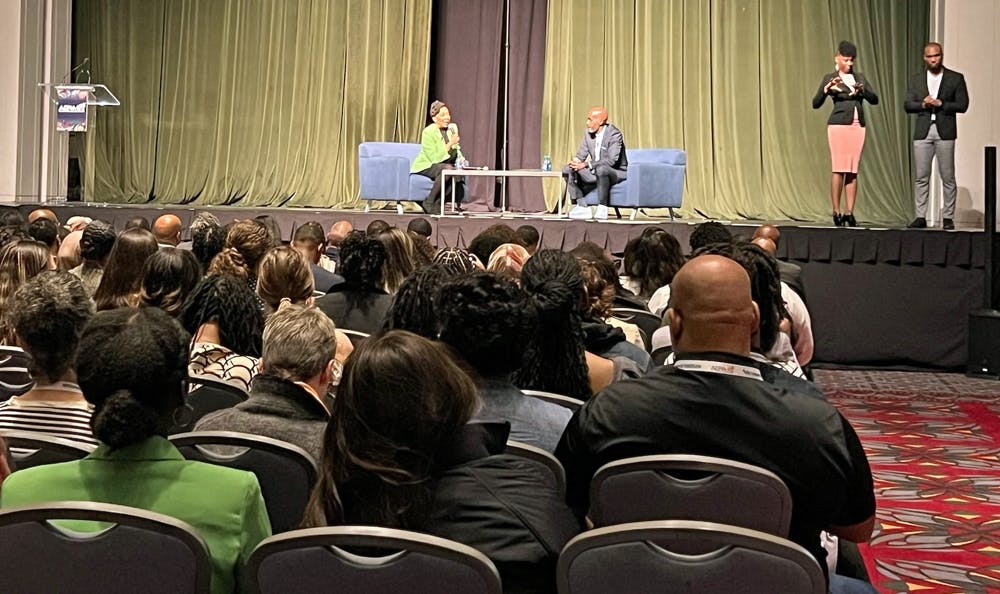
Hundreds of AERA participants attended the Annual Meeting’s opening plenary, which featured AERA President Tyrone Howard in conversation with Kimberlé W. Crenshaw, UCLA professor of law. Photo by Joanie Harmon
Presentations by UCLA Education community were evidence of this impact, given by faculty members, graduate and undergraduate students, and UCLA alumni who are doing innovative work at institutions across the nation. The Annual Meeting was launched with an opening plenary on April 11 titled, “Fighting Back to Move Forward: Defending the Freedom to Learn In the War Against Woke,” with Professor Howard in conversation with his colleague, Kimberlé W. Crenshaw, UCLA professor of law, who is also the founder and director of the Center for Intersectionality & Social Policy Studies and a professor of law at Columbia University.
The following is a sampling of the ways that UCLA scholars explored questions of race and education at AERA:
Marisa Saunders, associate director for research at the UCLA Center for Community Schooling, chaired a symposium titled, “Community Schools: A Strategy for Supporting and Sustaining (BIPOC) Teachers,”exploring the role and potential of community schools to support and sustain Black, Indigenous and other people of color as teachers. The symposium considered educational research on the community schools’ strategy and the experiences of teachers working within these school settings to address longstanding injustices and inequities in education.
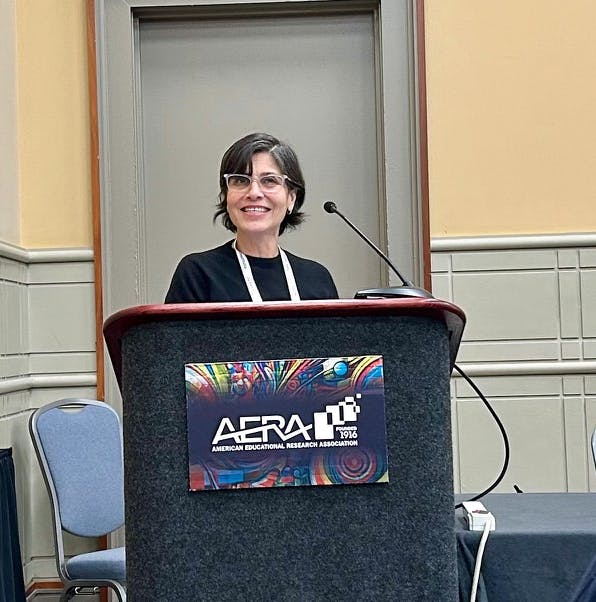
Marisa Saunders, associate director for research at the UCLA Center for Community Schooling. Photo by John McDonald
Saunders was joined in the symposium by UCLA Ed&IS doctoral students Tomoko Nakajima, Jeffrey Yo, and Natalie Fensterstock who presented papers exploring the themes, patterns, and emerging areas of inquiry about the role, experiences, and career trajectories of community school teachers with an emphasis on Black, Indigenous, People of Color (BIPOC) teachers. Together, the papers explore how community schools can provide the structural, organizational and cultural supports necessary that encourage teacher longevity.
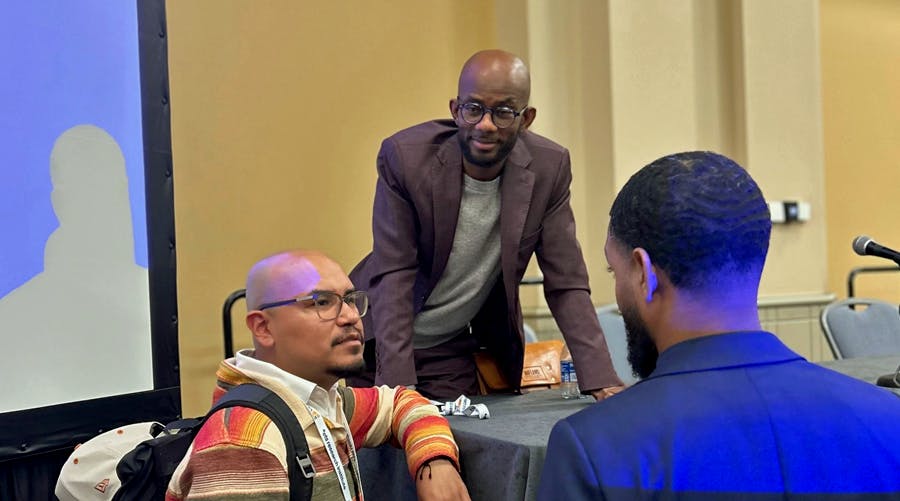
UCLA Professor of Education Eddie Cole (at center) presented his paper, “W. E. B. Du Bois and New Directions in Future Research on Black Higher Education.” Photo by John McDonald
Professor of Education Eddie Cole lit up the room in the session, “W. E. B. Du Bois in Our Times: Toward Racial Justice in Education in the 21st Century.” Commenting on his paper, “W. E. B. Du Bois and New Directions in Future Research on Black Higher Education,” he contended that the 2024 AERA Annual Meeting was the ideal moment to reflect on Du Bois and his contemporaries’ scholarship while assessing new directions saying, ” Du Bois would challenge us to speak up and speak out against the very real attack on public education. We can’t sit idle in this moment – there is much work to be done and much hell to raise.”
An AERA Presidential Session honored the work of the late UCLA Professor of Education Mike Rose, titled, “Scholarship That Befits a Democracy: Disrupting Educational Inequality Through the Scholarship of Mike Rose.” Wasserman Dean Christina Christie summed up the work of her former colleague, a prolific writer whose 11 books and numerous articles chronicled the challenges of marginalized students across the nation throughout K-12, community colleges, universities, and vocational training.
“An overarching goal of Mike’s work was to show and explain how and why the ways in which education is a complex human endeavor,” said Dean Christie. “He used these observations to address some of the most pressing issues in education. He accomplished this by studying what was extraordinary about the ordinary. Through considerate narratives, he brought you close to the person, the student, the teacher in the classroom, the intimate look that helped us understand the complexity of contemporary social issues, because we were seeing these issues through a story of human experience.
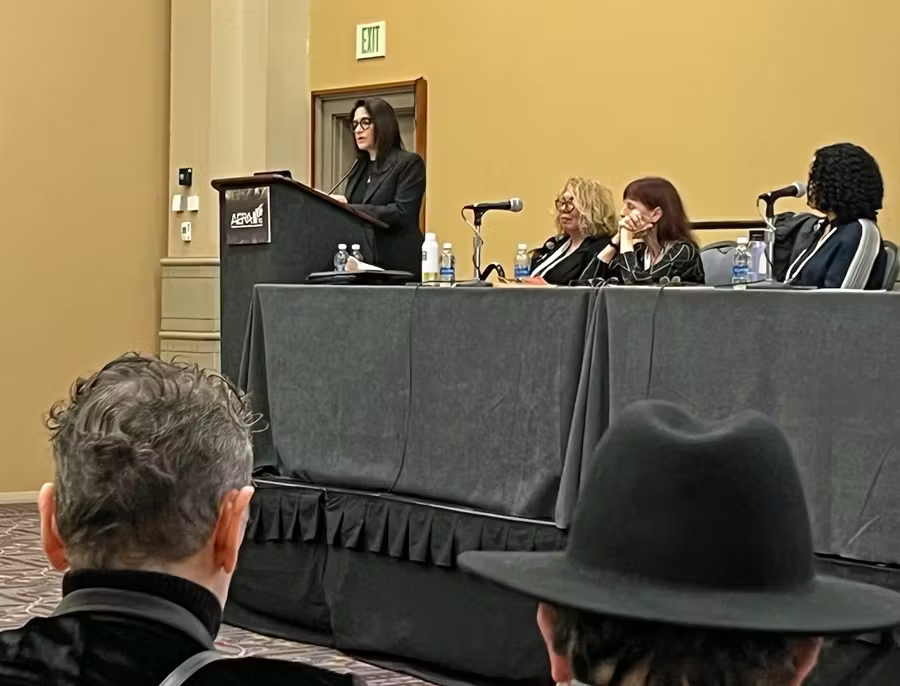
An AERA Presidential Session featured Wasserman Dean Christina Christie summing up the work of the late Mike Rose, UCLA professor of education, a prolific writer whose 11 books and numerous articles chronicled the challenges of marginalized students across the nation. Photo by Joanie Harmon
“Mike was concerned about how the discussion of education in our country has for so many decades now, turned away from understanding education as cognition and pedagogy fundamentally as a human experience, and instead, as focused on, as he wrote, ‘education as a means to secure individual advantage and maintain global economic prominence,'” Dean Christie said. “He was a champion of the promise of high quality education for all and he noted the ways in which education matters for health, for quality of life, for democracy, and for a civil society.”
In an invited AERA Roundtable session promoting “AERA Promising Scholarship in Education Research: Dissertation Fellows and Their Research,” doctoral candidate Demeturie Toso-Lafele Gogue presented his poster, “The Undercurrents of Institutionalization: How AANAPISIs Navigate a Racialized Process to Promote Pacific Islander Student Success.” His study documents the strategies that administrators, faculty, and staff at AANAPISIs employ to institutionalize aspects of their grant-funded programs.
“I really look at how college campuses in the Pacific and in the United States invest in sustaining efforts beyond their five-year grant funding from the federal government. I’m looking at how institutions are investing in diversity initiatives,” Toso-Lafele Gogue says. He contends there is a need to examine the process of institutionalization through a racialized lens.
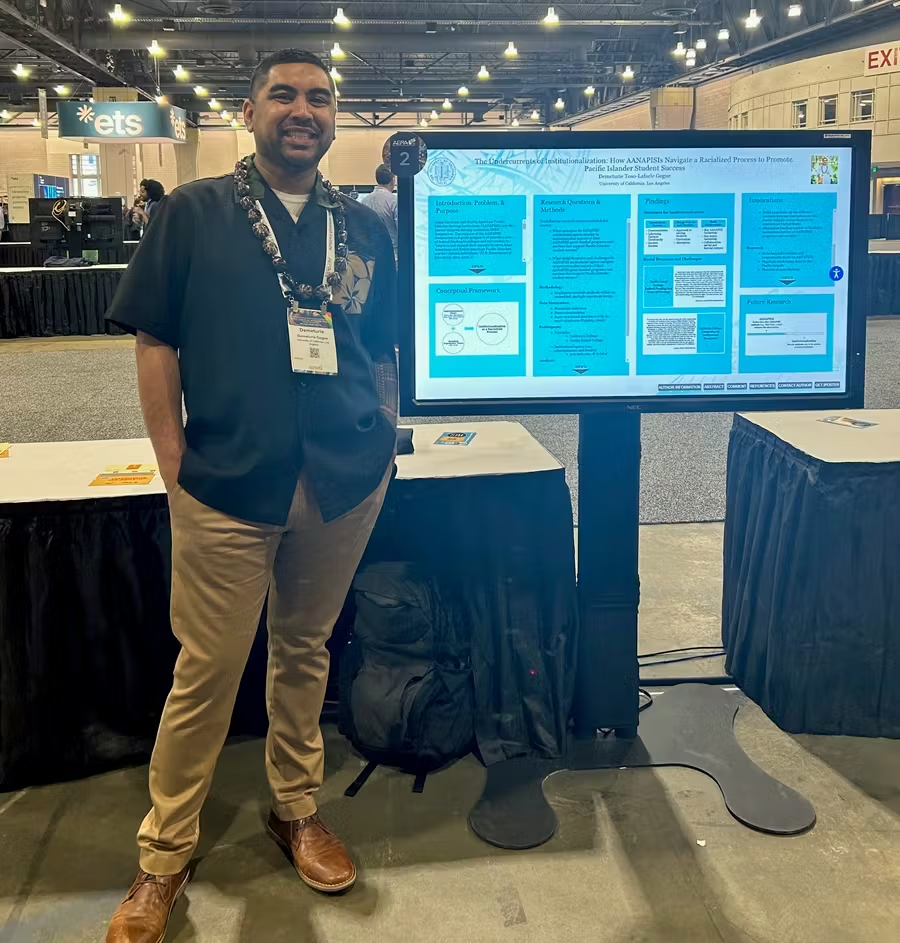
Demeturie Toso-Lafele Gogue presented his poster based on the strategies that administrators, faculty, and staff at AANAPISIs employ to institutionalize aspects of their grant-funded programs. Photo by John McDonald
“Institutionalization as a bureaucratic process is not race-neutral,” he said. “It is laced with racial tensions and dynamics that we need to uncover and talk about and think about what institutionalization is so hard to achieve.”
Professor of Education Daniel Solórzano was the discussant in a great session chaired by PhD student JC Lugo titled, “Liberation as Political Imperative: Toward the Conceptualization of Ethnic Studies Education.” Amid intensifying state amid national debates over Ethnic Studies, long-time advocates discussed “Ethnic Studies Education” as a strategic intervention to embolden education scholars to pursue critical, life-affirming work that guides and supports contemporary Ethnic Studies activism. Panelists addressed how Ethnic Studies Education can better achieve the emancipatory potential of education, what Ethnic Studies educators teach, how we prepare and support Ethnic Studies teachers and students, and the role of activism and research.
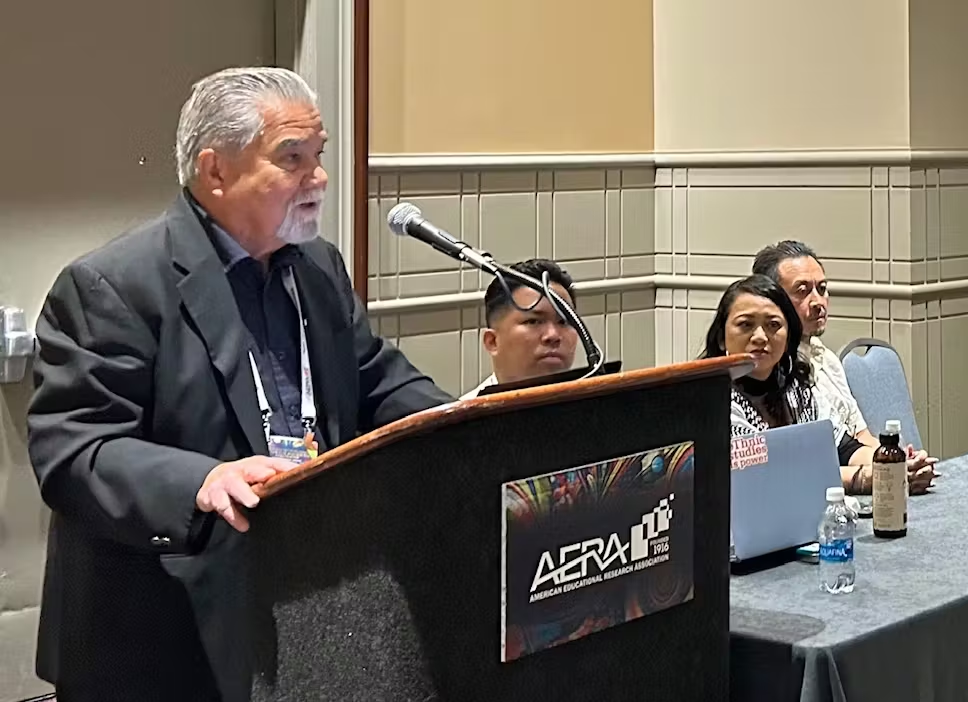
Professor of Education Daniel Solórzano served as discussant in for the session, “Liberation as Political Imperative: Toward the Conceptualization of Ethnic Studies Education.” Photo by John McDonald
Telling those in attendance of his early experiences in ethnic studies, or as he pointed out, “Mexican studies or Black studies,” Solórzano said, “I brought a story, we all have stories, we all came to ethnic studies from various pathways. These experiences, these early experiences were absolutely critical to my coming to critical consciousness, which I am still coming to — it never ends.”
In a packed roundtable session, UCLA Teacher Education Program advisor Darlene Lee and her colleague, Josephine Pham, assistant professor at UC Santa Cruz, made the case for Culturally Sustaining Teacher Educator Pedagogy as a framework for supporting the preparation of K-12 teachers committed to social justice, with their paper, “Culturally Sustaining Pedagogies of Teacher Education: Centering the Well-Being of Teacher Candidates of Color.”
“How do we model and enact the culturally sustaining strategies that we hope teacher candidates will also be able to enact in their classrooms as they work with students of color, and what are the ways that we can perpetuate and foster the linguistic, literate, and cultural assets of communities of color within our roles in teacher education?” Lee asked session participants. The discussion explored how curriculum, critical literacies, practices, actions, and context shape teacher educator pedagogy and K-12 teacher learning.
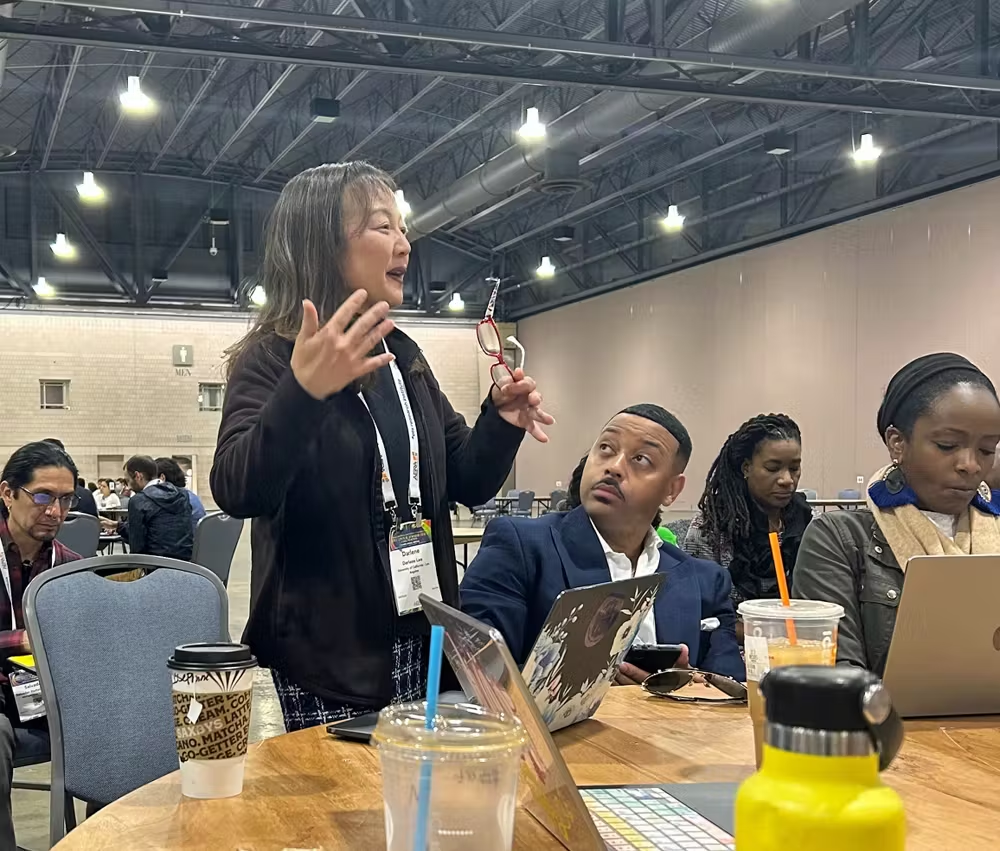
UCLA Teacher Education Program advisor Darlene Lee made the case for Culturally Sustaining Teacher Educator Pedagogy as a framework for supporting the preparation of K-12 teachers committed to social justice. Photo by John McDonald
Lauren Arzaga Daus, a second-year graduate student in Urban Schooling, co-presented “PEP PODS: Pin@y Educational Partnerships’ Praxis-Oriented Development Series,” with Jocyl Sacramento of CSU East Bay, during a session titled “Offerings of Love and Accountability: Cultivating Empathy Through Loss and Grief.” UCLA Education alumnae Sharim Hannegan-Martinez and Allyson Tintiangco-Cubales also participated in this session.
In their paper, Arzaga Daus and Sacramento focused on the response of Pinay scholar-activists to national and local movements in the summer of 2020, and their creation of “third spaces” called PEP PODS. School and community practitioners took part in virtual discussions called kuwentuhan, a Filipinx cultural practice/method of exchanging dialogue, reflections, and analysis to make meaning of their relational experiences. The PEP PODS also collectively read a book a month that focused on anti-Black racism, ableism, or sexism, including “Freedom Dreams: The Black Radical Imagination” by UCLA Distinguished Professor of History Robin D.G. Kelley; “Me and White Supremacy: Combat Racism, Change the World, and Become a Good Ancestor,” by Layla Saad; and “Care Work: Dreaming Disability Justice by Leah Lakshmi Piepzna-Samarasinha.”
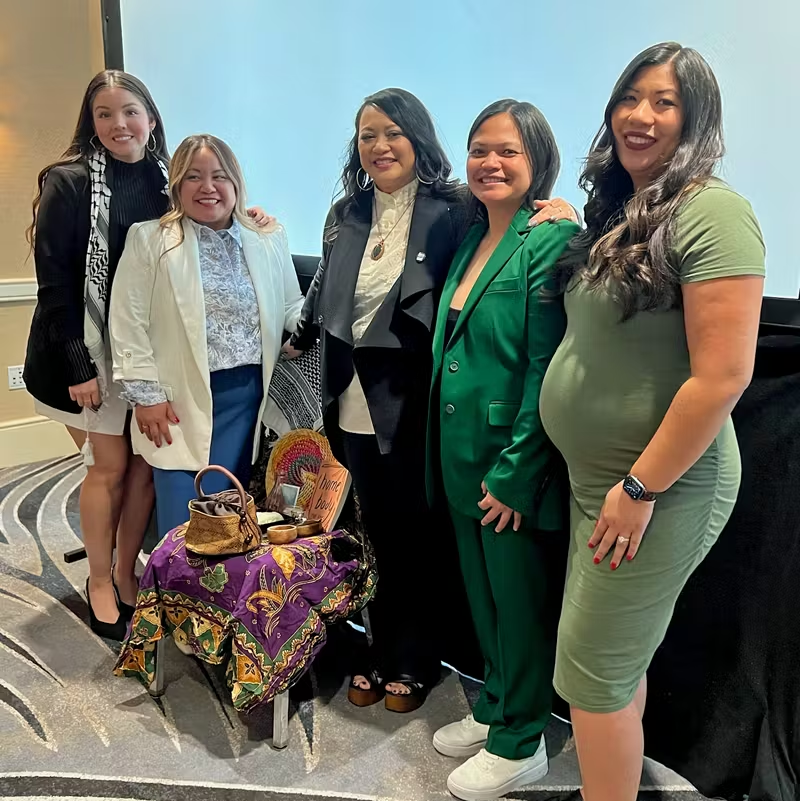
UCLA graduate student Lauren Arzaga Daus (second from right) and UCLA alumnae Sharim Hannegan-Martinez (far left) Allyson Tintiangco-Cubales (at center) participated in a session on ““Offerings of Love and Accountability: Cultivating Empathy Through Loss and Grief.” Pictured with Arlene S. Daus-Magbual, San Francisco State University; and Jocyl Sacramento, CSU East Bay. Photo by Joanie Harmon
The co-authors also examined how third spaces allow school and community practitioners to inform their praxis and pedagogies and allowed for imagining and strengthening of solidarities and empathy across racial groups during the isolation of the COVID-19 pandemic. Currently, PEP PODS continues to meet.
“We created PEP PODS to respond to the need for school and community practitioners to have a collective space where they could make sense of their identities and commitments in the midst of community grief during the summer 2020 uprisings,” Arzaga Daus and Sacramento wrote. “PEP PODS as a third space has been instrumental in welcoming and centering our humanity as we continue to endure oppressive and unconducive working environments… we continue to engage in this third space because it serves as a reminder of the many possibilities that can exist outside of educational spaces and workplaces.”
Julieta Rico presented “Navigating Fronteras: How Physical and Symbolic Borders Manifest for Latinx Teachers in Schools,” during a session on “BIPOC Teacher Resistance and Solidarity.” A doctoral student in the Urban Schooling division, her research on bilingual education, funding, tracking, and English learner student success in the context of the Rio Grande Valley, stems from her experience of teaching English language arts to 7th graders in Harlingen, Texas.
In her presentation at AERA, Rico shared maps and illustrations created by Latinx teachers during pláticas around invisible but undeniable “borders” at schools, where certain teachers are seemingly “allowed” while others are not. Three main themes of Rico’s work were the shifting of teachers’ identity, the importance of their classrooms, and meaning making through mapping. The pláticas created a space to talk about teachers’ experiences in and around their classrooms and the isolation that they felt at times. The drawings by the teachers depicted their perceptions of themselves on their campuses, both locationally and emotionally. Rico described a drawing by a California teacher, who depicted her school from the outside entrance.
“I asked her, ‘Why did you draw the front of the school?’ She goes (sic), ‘I don’t feel like I belong inside the school, so I didn’t feel comfortable sharing how I walk around it. I showed you the front of the school because that’s the best place I belong.’”
Rico highlighted the difference in candor between the California teachers and her Texas colleagues.
“It was interesting to see the difference in the way the teachers spoke about their spaces,” she said. “California teachers were much more open: ‘It’s systematic oppression this is what we’re seeing.’ They were very vocal and had the language and vocabulary to speak about it. The Texas teachers were silent and hesitant. We were all first-year teachers together, and it wasn’t until I shared a very vulnerable story [about myself], then it started that conversation.”
Two AERA Presidential Sessions provided stunning support of the conference theme by addressing the issues in race and education from the viewpoint of students’ formations of identity and truth. AERA President Tyrone Howard chaired “Lessons and Reflections From Ghana: Toward Justice and Freedom in the U.S. Education System,” which featured work by UCLA Education graduate student researchers, and UCLA alumni who are in academic positions nationwide, including Keara Williams, Jaleel Howard, Earl Edwards, Tr’Vel Lyons, Gene McAdoo, Demontea Thompson, and Kenyon Lee Whitman. Cynthia B. Dillard, dean of the College of Education at Seattle University and a longtime mentor of Professor Howard, served as discussant.
The research presented in this session was based on recent visits to Ghana made by Professor Howard and his cadre of students in order to examine the cultural practices of Africa that few African Americans have knowledge of, and the history of the slave trade that is commemorated at sites in Africa.
One of the papers in this session titled, “Finding Your Brother: Exploring Black male counterspaces as a pathway to resilient identity and healthy expressions of masculinity,” was presented by Lyons, a UCLA alumnus who is now a postdoctoral research associate in the USC Rossier School of Education, and McAdoo, a second-year doctoral student in the division of Urban Schooling. Their paper was inspired by the work of Saidiya Hartman and her book, “Lose Your Mother: A Journey Along the Atlantic Slave Route,” which they read in preparation for the journey to Ghana, for its perspective on creating personal memoirs combined with historical exploration.
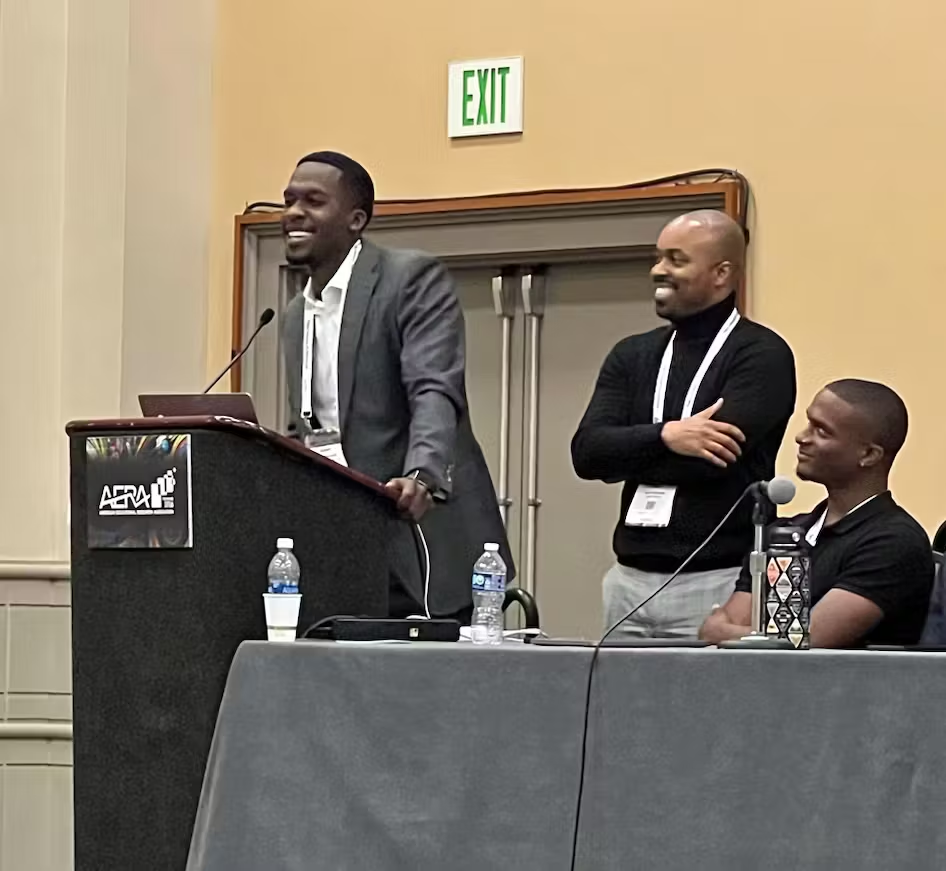
UCLA alumni Tr’Vel Lyons (at podium) and Earl Edwards, along with Gene McAdoo, doctoral candidate, presented their research and personal reflections in an AERA Presidential Session on “Lessons and Reflections From Ghana: Toward Justice and Freedom in the U.S. Education System.” Photo by Joanie Harmon
“During this trip, we found ourselves grieving the lives we may have lived, the cultural practices we may have had, if not stolen away,” said Lyons. “We felt our privilege should be put to good use, but how? As educators, we didn’t just traverse geographic locations, but we embarked on an introspective journey into the past, connected deeply with…slavery, colonialism, which is inextricably connected to our understanding of the essence of Black masculinity and identity.”
Williams is a UCLA alumna (BA, American Literature, M.Ed, Teacher Education Program) and is currently a doctoral student in the division of Urban Schooling and a former LAUSD English teacher. She presented, “(Re) Membering and (Re) Claiming Who We Are to Conduct Purposeful Research: A Black Woman’s Inner Journey,” inspired by her travels with the group in Ghana and the opportunity to share community and fellowship with Black women there. She also drew from her experience as a Black teacher, and addressed the lack of representation throughout the teaching fields.
“Black teachers are significantly underrepresented and in many places, serving as the only one in their school or district,” said Williams. “While Black students comprise 14.9% of students enrolled in public schools, Black teachers make up just 7% of K-12 teachers nationally.”
Another AERA Presidential Session brought home the focus of the Annual Meeting, utilizing the voices of those affected the earliest by racism in education: elementary school students. UCLA alumnus Laurence Tan led his 5th grade class at Oakland Academy of Knowledge in a presentation on, “Researching the Reparations in Schools: Urban Youth as Researchers of School Quality,” highlighting a project that was researched and presented by the students themselves. Their study was based on Oakland Unified School District’s Black Reparations Initiative, and explored the students’ findings on the implementation and quality of impact of the initiative in their school, which is located in East Oakland, an area that has been beleaguered by gentrification and corporate chartering of schools.
“Conducting this project with my 5th graders for AERA 2024 in Philly was a transformative experience not only for them, but me as well,” said Tan, who recently appeared with his students on KTVU-FOX to speak about the experience. “Students were able to engage and tackle college level reading and research in the most meaningful ways. I have presented at many AERA sessions, and have also shared space with youth, but this is the first time I have done it with all current 5th graders. This experience was definitely a phenomenal experience and proud moment as we left it all out there for Oakland. What kept them going through all the major moments was the fact that they knew their work and presentation would matter and help make changes for their community of Oakland, and beyond.”